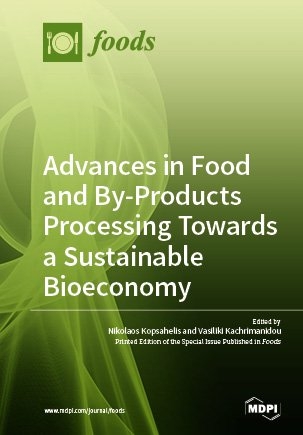
Advances in Food and By-Products Processing Towards a Sustainable Bioeconomy
Seiten
2019
MDPI (Verlag)
978-3-03921-752-6 (ISBN)
MDPI (Verlag)
978-3-03921-752-6 (ISBN)
- Keine Verlagsinformationen verfügbar
- Artikel merken
The bioeconomy initially focused on resource substitution, including the production of biomass from various resources; its conversion, fractionation, and processing by means of biotechnology; and chemistry and process engineering towards the production and marketing of food, feed, fuel, and fibre. Nevertheless, although resource substitution is still considered important, the emphasis has been recently shifted to the biotechnological innovation perspective of the bioeconomy, in terms that ensure environmental sustainability.
It is estimated that around one-third of the food produced for human consumption is wasted throughout the world, posing not only a sustainability problem related to food security but also a significant environmental problem. Food waste streams, mainly derived from fruits and vegetables, cereals, oilseeds, meat, dairy, and fish processing, have unavoidably attracted the interest of the scientific community as an abundant reservoir of complex carbohydrates, proteins, lipids, and functional compounds, which can be utilized as raw materials for added-value product formulations.
This Special Issue focuses on innovative and emerging food and by-products processing methods for the sustainable transition to a bioeconomy era. Contributions addressing valorisation, the bioprocessing and biorefining of food industry-based streams, the isolation of high-added-value compounds, applications of resulting bio-based chemicals to food products, novel food formulations, economic policies for food waste management, and sustainability or technoeconomic analyses of the proposed processing methods are welcome in this Special Issue.
It is estimated that around one-third of the food produced for human consumption is wasted throughout the world, posing not only a sustainability problem related to food security but also a significant environmental problem. Food waste streams, mainly derived from fruits and vegetables, cereals, oilseeds, meat, dairy, and fish processing, have unavoidably attracted the interest of the scientific community as an abundant reservoir of complex carbohydrates, proteins, lipids, and functional compounds, which can be utilized as raw materials for added-value product formulations.
This Special Issue focuses on innovative and emerging food and by-products processing methods for the sustainable transition to a bioeconomy era. Contributions addressing valorisation, the bioprocessing and biorefining of food industry-based streams, the isolation of high-added-value compounds, applications of resulting bio-based chemicals to food products, novel food formulations, economic policies for food waste management, and sustainability or technoeconomic analyses of the proposed processing methods are welcome in this Special Issue.
| Erscheinungsdatum | 06.01.2020 |
|---|---|
| Verlagsort | Basel |
| Sprache | englisch |
| Maße | 170 x 244 mm |
| Themenwelt | Sachbuch/Ratgeber ► Natur / Technik |
| Naturwissenschaften ► Biologie ► Allgemeines / Lexika | |
| Technik ► Umwelttechnik / Biotechnologie | |
| Schlagworte | Arabinoxylan • ash content • Aspergillus awamori • Bacterial Cellulose • Bioactive Compounds • Biodegradability • biodiesel • Bioeconomy • Bioprocess Development • Bioprocesses • Biorefineries • blood plasma protein powder • carotenoids • circular economy • circular-economy • clarified butter sediment waste • compost • drying method • edible films • emulsifier • Emulsion • Fatty acid methyl esters • Films • food biotechnology • Food Packaging • food-processing • Food Processing • food waste valorization • glucoamylase • Glucosamine • heat-induced gelation • Hydrogels • Hydrolysis • Hydrophilicity • hydrophobic substrates • integrated biorefineries • lactose esters • Lipids • microbial oil • Morchella • morel mushrooms • oleaginous yeast • Oleic acid • olive waste • Ostwald ripening • polysaccharides • prebiotics • Rhodosporidium toruloides • size exclusion chromatography (SEC) • Solid state fermentation • sorghum milling waste • submerged fungal fermentation • sustainability • texture • Waste Valorization • Whey Proteins |
| ISBN-10 | 3-03921-752-6 / 3039217526 |
| ISBN-13 | 978-3-03921-752-6 / 9783039217526 |
| Zustand | Neuware |
| Haben Sie eine Frage zum Produkt? |
Mehr entdecken
aus dem Bereich
aus dem Bereich
Über hybride Mineralien, Tiere, Pflanzen, Pilze ...
Buch | Hardcover (2023)
Matthes & Seitz (Verlag)
CHF 39,20
Band 2: Elektrizität, Optik und Wellen
Buch | Softcover (2022)
Wiley-VCH (Verlag)
CHF 55,85
Berufsbilder von und für Biologen und Biowissenschaftler
Buch | Softcover (2024)
Verband Biologie, Biowiss. u. Biomedizin in Dtl. e.V. (Verlag)
CHF 23,50


